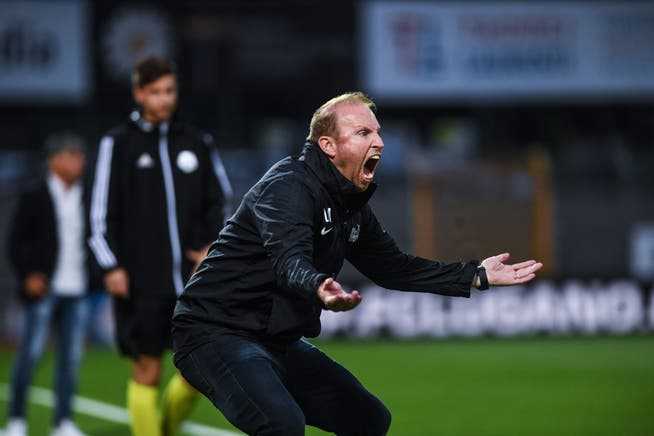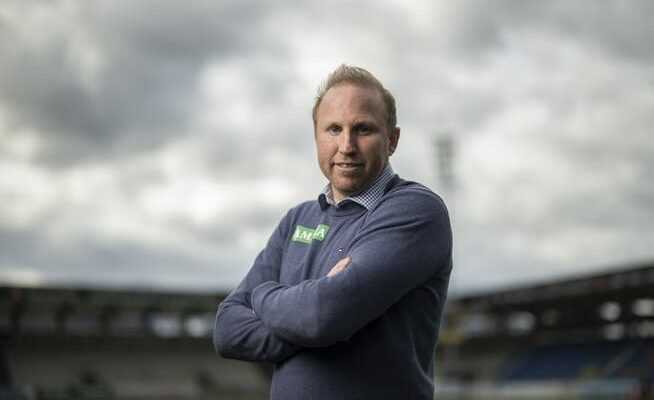Since his dismissal from FC Zurich in October 2020, things have been quiet about coach Ludovic Magnin. He is preparing to save the Austrian Bundesliga club Altach from relegation. And he can’t let go of the way he’s viewed in Switzerland.
Ludovic Magnin after his performance in the Schnabelholz Stadium of his new club Altach.
“In Zurich I got three years for a draw.” That’s the first sentence Ludovic Magnin says to the journalists on Saturday night after the game, with his unmistakable facial expression that always seems a bit pained, even when he’s smiling like he is now.
The statement is false, he was accused of other things than a draw as a coach of FC Zurich; the cantering defeats, the verbal insults, the lack of consistency or the notorious complaints against the referees. But it’s saying something that even a year and a half after his release, Magnin, 42, still feels misunderstood and is struggling to have his legacy counted. That he worries that his merits could be forgotten, the cup victory in 2018, the magnificent European Cup nights against Leverkusen and Napoli.
One who breaks up the lethargy in this village association
Magnin is in Altach, in the Schnabelholz stadium, a modern football arena that looks like a foreign body in the rural surroundings of Vorarlberg, a region that is as charming as it is sleepy. In January, Magnin took over the SCR Altach team, at that time bottom of the table in the Austrian Bundesliga – shortly before that he had been one of the last candidates for the post at FC Luzern before Mario Frick was preferred to him.
At his presentation in Altach, Magnin said it was a conscious decision: to switch to a new league because he hoped that he could simply leave the “prejudices”, as he calls them, against him at home. Building up a new image as soon as the customs officer waved him across the border, which was not even three kilometers away: that was the idea, the plan.
But on Saturday Magnin performs pretty much exactly as he did in Zurich. He screams, runs, gesticulates, quarrels, curses. Let the fourth official know his anger. And donates fiery applause when one of his own wins a duel or gets a corner. The 90 minutes seem to be a battle of attrition for him, he suffers them and feeds on them.
Magnin’s emotionality is his trademark, sometimes strength, sometimes weakness. In Altach they chose him not least because the club needs someone to break the lethargy in this village club. And wakes people up, both internally and externally. It helps to sell tickets because the home games are only attended by an average of just under 3,600 spectators. Money is tight, the club has the logo of a betting provider in its coat of arms for financial reasons.
Magnin should not only achieve the league, but trigger something around the SCR. Sports director Werner Grabherr says it also played a role that Magnin lived for many years in the St. Gallen Rhine Valley, a 25-minute drive away. He is therefore “possibly more familiar with Vorarlberg than a coach from Vienna”.
? “My job as a coach is to build the team up in difficult moments and keep it grounded in successful phases!”
The entire episode of the ?. ???? ????-???? ??? ??? Mineral spa St. Margrethen:
➡ https://t.co/YKUUpDrhzt pic.twitter.com/32EhWoCJnJ— SCR Altach (@SCRAltach) April 15, 2022
Magnin is clever enough that he quickly tried to create a sense of togetherness. In one of his first interviews he said: «They want to see us all dismount. The clubs from Vienna and such. Half the league. So that they no longer have to drive eight hours each way to us.”
Magnin and his companions in the honorable, valiant battle against dark forces: that’s the narrative, and it resonates, in a region where there’s an underlying feeling that it tends not to be heard. Magnin thrives on this outsider role, it was like that in Zurich, it’s tailor-made for him, he always finds an injustice that’s worth denouncing. Sometimes Magnin seems like a footballing answer to Jean Ziegler.
And yet: The nationality will not only have helped, because Swiss coaches have rarely worked in Austrian club football. 2016/17 Maurizio Jacobacci failed at second division Innsbruck; the “Kicker” quoted a player after two months of work as follows: “We don’t know what we should do and what he actually wants from us.” In 2008, Urs Schönenberger, who had previously played with Thun in the Champions League, was consistently unsuccessful in Altach for four months; it was one of his last positions before he left for customer service at a body shop.
The offensive is the big weak point
Magnin read the old stories. At his debut, he said that was a good thing, so he could only exceed expectations. So far he has succeeded. After four defeats at the start of the Magnin era, Altach has been unbeaten for five games and is no longer last, although this is also due to the mode – the points were halved for the relegation round.
Altach’s big problem is the offensive. Already in the preliminary round. And also with Magnin. In eight games under him – he missed one due to a medical operation on his kidneys – Altach went five times without a goal. The harmlessness is so blatant that the coach recently teased that they “googled how to score goals”. On Saturday it is enough for a 0-0 against LASK, a much stronger opponent; Magnin proudly speaks of a “character performance in this fighting game”, for Altach it is a small victory. The spectators applaud happily.
Magnin enjoys it, he seems relaxed after the game. Gianluca Gaudino says that’s how the coach usually deals with the team. Anyone who perceives him as negative has not understood him. Gaudino, 25, once in St. Gallen and employed by YB, says: “He’s a very positive guy, his style rubbed off on the team. It’s fun to work with him.” Gaudino, who moved to Altach on loan from Sandhausen, and Magnin had the same plan: take a step back to relaunch your career in a place where you can work in peace.

Ludovic Magnin, as we know him, fiery on the sidelines, at that time still in the service of FC Zurich.
Altach is an idyll for Magnin, not least because of the media coverage. In the meantime, Magnin worked as a TV expert, he says the job has opened up new perspectives for him. And helped to understand the journalists better. He’s been working in football for so long and was always amazed at the “media negativity that often comes across”. Now he would understand the processes and considerations better.
He often felt he was being treated unfairly in the media city of Zurich, and to this day he has not forgiven some of the articles in the NZZ. When he was still FCZ coach, he said recently, after losing two games, the press would have asked him if he could actually still reach the team. It’s completely different now, “human respect is sometimes rated higher than I’ve known before”.
Maybe two have found each other, Magnin and the SCR Altach. If the coach manages to avoid relegation, the contract is valid until 2023. Maybe that’s enough time to put on a new label in the anonymity of Altach. And to forget the Zurich pain of separation a bit.
